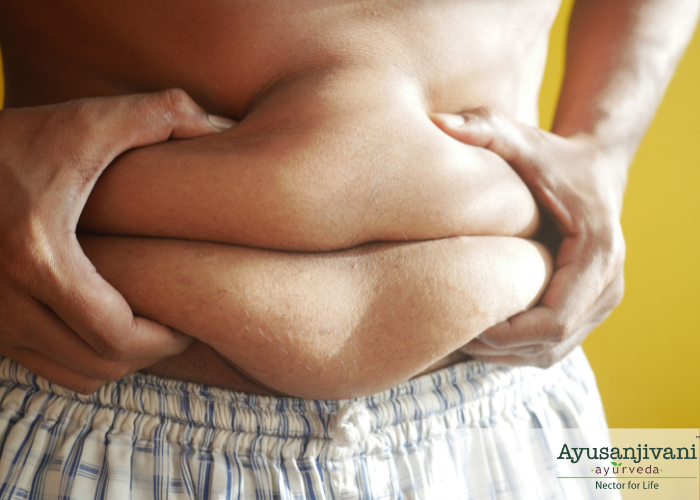DEFINITION | TYPES | CAUSES | SYMPTOMS | TREATMENTS | FAQ’S | TESTIMONIALS

What is Obesity?
Obesity is a medical condition characterized by an excess accumulation of body fat to the extent that it may have adverse effects on health. It is typically assessed using the body mass index (BMI), which is a measure of body fat based on height and weight. In adults, a BMI of 30 or higher is generally considered obese.The management of obesity typically involves a combination of lifestyle changes, dietary modifications, increased physical activity, and sometimes medical interventions.
Obesity is a medical condition characterized by excess body fat accumulation, often linked to lifestyle factors and associated with various health risks.
Preventing obesity involves maintaining a healthy lifestyle from an early age. This includes eating a nutritious diet, engaging in regular physical activity, and adopting healthy habits.
Obesity is a serious health concern with widespread implications. It’s important for individuals to work with healthcare providers to manage and address obesity to reduce the associated health risks and improve overall well-being.
Types of Obesity
Experience Natural Healing at Ayusanjivani : Personalized Ayurvedic Solutions for Obesity
Visceral Obesity
This type of obesity involves the accumulation of fat around internal organs, such as the liver, pancreas, and intestines. Visceral fat can increase the risk of metabolic disorders and cardiovascular diseases.
Subcutaneous Obesity
Subcutaneous fat is located beneath the skin's surface and is more noticeable as excess body weight. It contributes to overall body mass and can affect physical appearance.
Android Obesity
Also known as central obesity, this type is characterized by excess fat around the abdominal region, often giving rise to an "apple-shaped" body. Android obesity is associated with an increased risk of heart disease and diabetes.
Gynoid Obesity
Gynoid or pear-shaped obesity involves the accumulation of fat around the hips and thighs, resulting in a "pear-shaped" body. It is more common in women and may have a lower risk of metabolic complications compared to android obesity.
Childhood Obesity
Obesity can affect individuals at a young age, leading to significant health concerns, including diabetes and heart disease. Early intervention is crucial in managing childhood obesity.
Morbid Obesity
Morbid obesity is a severe form of obesity characterized by a Body Mass Index (BMI) of 40 or higher. It poses significant health risks and often requires medical intervention.
Get a free Assessment Call
Ayurvedic treatment provides a comprehensive and natural approach to Obesity Treatment. To book an appointment with our experienced Ayurvedic practitioners at Ayusanjivani Ayurveda Clinic in Kharadi, Pune.
Causes of Obesity
Consuming high-calorie, low-nutrient foods like fast food, sugary drinks, and processed snacks can contribute to weight gain.
A sedentary lifestyle with minimal physical activity can lead to weight gain and obesity.
Some individuals may have a genetic predisposition to obesity, making it harder for them to maintain a healthy weight.
Hormonal imbalances and certain medical conditions can affect metabolism and lead to obesity.
Emotional factors like stress, depression, or trauma can contribute to overeating and obesity.
Common Symptoms of Obesity
The primary symptom of obesity is excessive weight gain, often characterized by a high body mass index (BMI).
Obesity results in an increased amount of body fat, particularly around the abdomen, hips, and thighs.
Obesity can lead to breathlessness, especially during physical activities or even at rest.
Carrying excess weight can cause fatigue and a reduced ability to engage in physical activities.
Obesity puts extra stress on joints, leading to joint pain, particularly in the knees, hips, and lower back.
Ayurvedic Treatments for Obesity
Experience Natural Healing at Ayusanjivani : Personalized Ayurvedic Solutions for Obesity

In Ayurveda, the treatment of obesity typically involves a combination of therapies to address the underlying imbalances in the body. Some common procedures used in Ayurvedic Obesity treatment include:
1. Vrikshamla (वृक्षाम्ल): Vrikshamla, also known as Garcinia Cambogia, contains hydroxycitric acid (HCA) that may help suppress appetite and inhibit fat production.
2. Varanadi Kwath (वरुणादि क्वाथ): Varanadi Kwath is an herbal decoction that aids in weight management by improving digestion and fat metabolism.
3.Triphala (त्रिफला): Triphala is a blend of three fruits that aids in digestion, detoxification, and weight management.
4.Guggul (गुग्गुल): Guggul is an herbal resin known for its lipid-lowering and metabolism-boosting properties.
4. Agni Mantha (अग्निमन्थ): Agni Mantha is an herbal formulation that helps improve digestion and regulate metabolism, promoting weight loss.
5. Yoga and Pranayama (योग और प्राणायाम): Customized yoga and breathing exercises may be prescribed to improve metabolism and promote weight loss.
6.Musta (मुस्ता): Musta is an herb that helps regulate digestion and supports weight loss by reducing excess fat.
FAQ's
Ayurvedic treatments are generally safe when administered by qualified practitioners.
Our experts provide personalized dietary guidance based on your condition, which may include dietary modifications.
Maintenance treatments or lifestyle changes may be advised to prevent weight regain.
Yes, customized yoga exercises can help improve metabolism and aid in weight loss.
Results may vary, but many patients experience noticeable changes within a few months.
It’s essential to inform your Ayurvedic practitioner about any other treatments or diets you may be following for coordinated care.
Ayurvedic treatments are natural and usually have minimal to no side effects when administered correctly.
Yes, our treatments are tailored to your specific needs and health condition for the best results.
